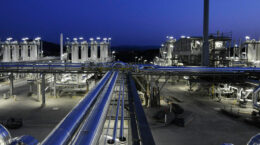The battery materials market is growing rapidly with challenges, but none that outweigh the benefits of our EV future. Despite the hurdles in creating battery materials with superior performance, affordability, and sustainability—BASF is committed to continuing our path as a leading global cathode active material (CAM) supplier.
4 Keys to Success in Overcoming Challenges Facing the Global Battery Materials Business

There are four keys to the success of our battery materials future at BASF: expand our global operations footprint to serve our customers locally, advance technology, provide competitive offerings, and reduce environmental impact.”
Expanding Our Global CAM Footprint
By BASF’s projections, in 2030, roughly 30 percent of all cars produced worldwide will be either fully electric or plug-in hybrids—and 70 percent of the battery electric vehicles will be produced in either Europe or China. This growth in the electric vehicle market brings in huge potential in the CAM market as well—by more than 20 percent annually through 2030.
Strong market presence with cathode active materials operations in all major regions

In line with these projections, BASF is scaling up production capacity footprint in Asia, Europe, and North America—the biggest near-term and future CAM markets. To implement this growth plan, BASF is targeting investments worth €3.5 billion to €4.5 billion between 2022 and 2030.
BASF's new production capacities for precursor cathode active material (PCAM) and CAM in Europe are under construction now and the startup of both sites is planned in 2022, including one CAM plant in Schwarzheide Germany, and one plant for PCAM in Harjavalta, Finland.
BASF promises an unrivaled global footprint equipped with leading annual CAM capacity of 160 kilotons by 2022 also thanks to the formation of two majority-owned joint ventures in Japan and China and existing capacity in the U.S..
Advancing CAM Technology
As one of the largest chemical suppliers to the automotive industry, BASF has unparalleled customer access and a deep understanding of the automotive market and battery materials chemistry. This gives us the insight to drive innovation and the ability to develop future cathode materials by investing in research and development.

Our scientists and experts in R&D labs and applications development centers are located around the world, intentionally close to our customers, not only for their convenience—but more so, for their collaboration for product development and qualifications. We also pursue in-depth collaboration with academia on next-generation battery materials development, tapping some of the world’s brightest minds to help ensure a more sustainable future.
In addition, in April 2021, BASF entered a cross-licensing agreement with Umicore covering a broad range of CAM and precursors (PCAM), allowing both partners to combine a wider range of IP-protected technologies related to features such as chemical composition, powder morphology and chemical stability.
Providing Competitive CAM Offerings
We like to offer our customers the best - from sustainable production, technical support and service, recycling solutions, and a reliable global supply, in addition to high-quality products.
Our excellent international R&D capabilities help us co-create breakthrough innovations with our customers and partners. Our scale, expertise, and access to capital position us to meet customers’ needs. Our various partnerships for raw materials ensure that we have secure and reliable metal supply.

Reducing Environmental Impact of CAM Production
We strongly believe that electromobility should be based on batteries that are produced with high social and environmental standards. BASF aims to contribute with the lowest-CO₂ CAM solutions in Europe to relentlessly strive for a unique, reliable, and sustainable battery value chain. We are effectively researching and developing CAM with a higher energy density leading to less materials consumption for batteries and enabling a longer driving range of cars. We are implementing innovative calcination technologies and Leading production technologies for reaction steps to reduce the footprint during manufacturing. We practice sustainable raw materials sourcing and explore recycling solutions without compromising performance and cost competitiveness.

In Europe, our recent investments will enable us to have efficiency gains through a concentrated value chain within one region. This same regional focus will allow for short and reliable access to products in proximity to customers’ European manufacturing facilities, reducing energy consumption during transportation.
Alongside this regional emphasis, our European investments will support the establishment of an industry-leading energy mix during production of cathode materials and closed-loop recycling. This will allow our future products with an even lower CO2 footprint compared to the industry average.
BASF will continue to contribute its strength as a leading global CAM supplier to the automotive industry. Our investments and our ongoing efforts to achieve a leading CO2 footprint along the value chain show our commitment to our industry and the future of our planet.”
All signs point to demand for electric vehicles continuing to accelerate, resulting in added pressure on suppliers to deliver. At BASF, we remain focused on our commitment to matching the speed of the market. Thanks to our unrivaled global footprint and commitment to sustainability, we are well-positioned to help our customers continue to rise to meet the challenge of e-mobility today and in the years to come.


